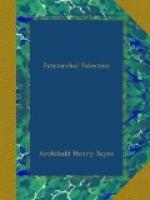The misdeeds of Beya or Baya did not end here. We hear of him again as attacking and capturing a body of soldiers who had been sent to defend the royal palace at Joppa, and as occupying that city itself. He was, however, subsequently expelled from it by the king’s orders. Beya, too, professed to be an Egyptian governor and a faithful servant of the Pharaoh, to whom he despatched a letter to say that Yankhamu, the High Commissioner, was not in his district. Probably this was in answer to a charge brought against him by the Egyptian officer.
The official duties of Yankhamu extended over the whole of Palestine, and all the governors of its cities were accountable to him. We find him exercising his authority not only in the south, but also in the north, at Zemar and Gebal, and even among the Amorites. Amon-apt, to whom the superintendence of Phoenicia was more particularly entrusted, was supplied by him with corn, and frequent references are made to him in the letters of Rib-Hadad. Malchiel complained of his high-handed proceedings, and the complaint seems to have led to some confidential inquiries on the part of the home government, since we find a certain Sibti-Hadad writing in answer to the Pharaoh’s questions that Yankhamu was a faithful servant of the king.
The country east of the Jordan also appears to have been within his jurisdiction. At all events the following letter was addressed to him by the governor Mut-Hadad, “the man of Hadad.” “To Yankhamu my lord thus speaks Mut-Hadad thy servant: at the feet of my lord I prostrate myself. Since Mut-Hadad has declared in thy presence that Ayab has fled, and it is certified (?) that the king of Bethel has fled from before the officers of the king his lord, may the king my lord live, may the king my lord live! I pray thee ask Ben-enima, ask ... tadua, ask Isuya, if Ayab has been in this city of Bethel for [the last] two months. Ever since the arrival of [the image of] the god Merodach, the city of Astarti (Ashtaroth-Karnaim) has been assisted, because all the fortresses of the foreign land are hostile, namely, the cities of Udumu (Edom), Aduri (Addar), Araru, Mestu (Mosheh), Magdalim (Migdol), Khinianabi (’En han-nabi), Zarki-tsabtat, Khaini (’En), and Ibi-limma (Abel). Again after thou hadst sent a letter to me I sent to him (i.e. Ayab), [to wait] until thy arrival from thy journey; and he reached the city of Bethel and [there] they heard the news.”
We learn from this letter that Edom was a “foreign country” unsubdued by the Egyptian arms. The “city of Edom,” from which the country took its name, is again mentioned in the inscriptions of the Assyrian king Esar-haddon, and it was there that the Assyrian tax-gatherers collected the tribute of the Edomite nation. It would seem that the land of Edom stretched further to the north in the age of Khu-n-Aten than it did at a subsequent period of history, and that it encroached upon what was afterwards the territory of Moab. The name of the latter country is met with for the first time among the Asiatic conquests of Ramses II. engraved on the base of one of the colossal figures which stand in front of the northern pylon of the temple of Luxor; when the Tel el-Amarna letters were written Moab was included in the Canaanite province of Egypt.




